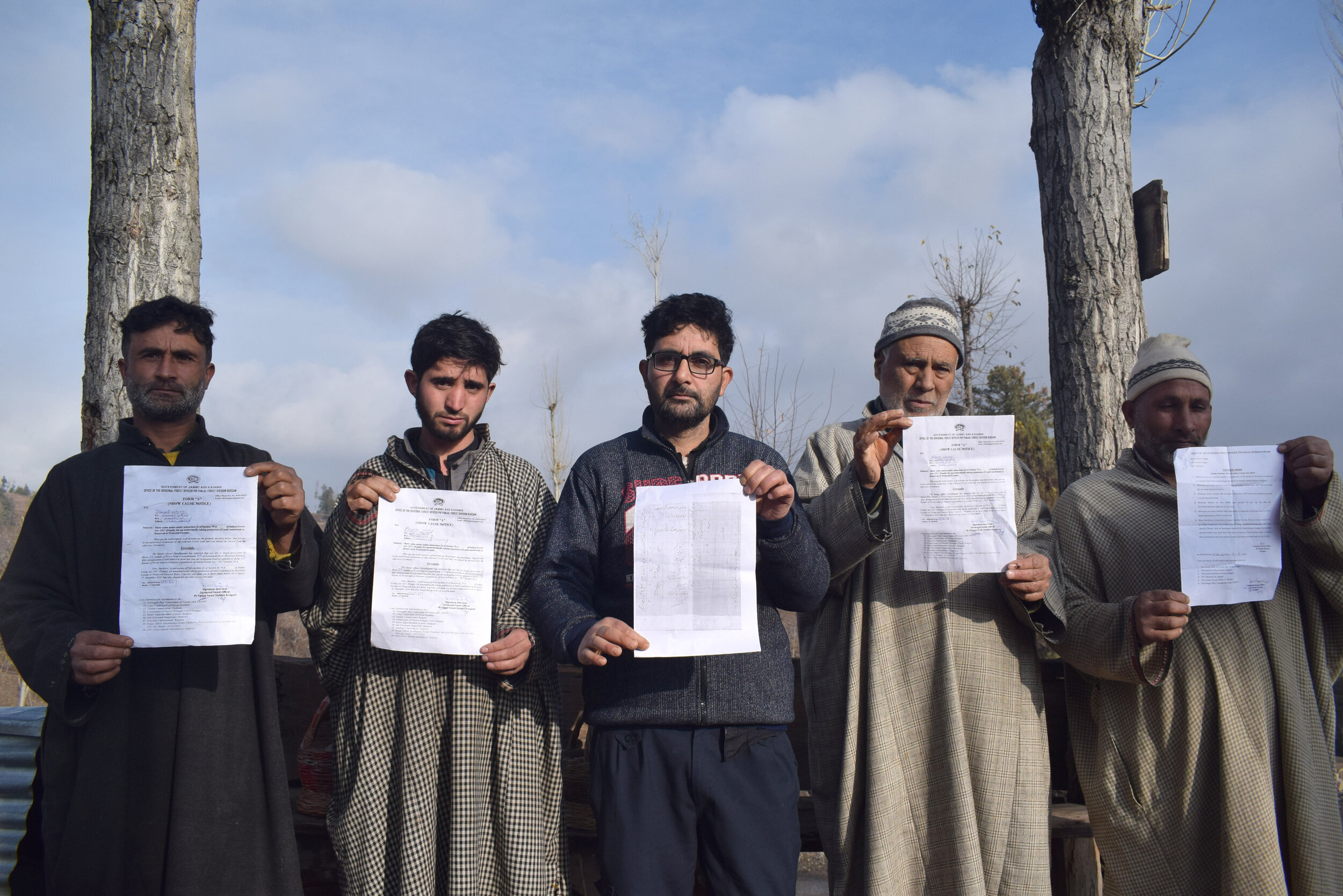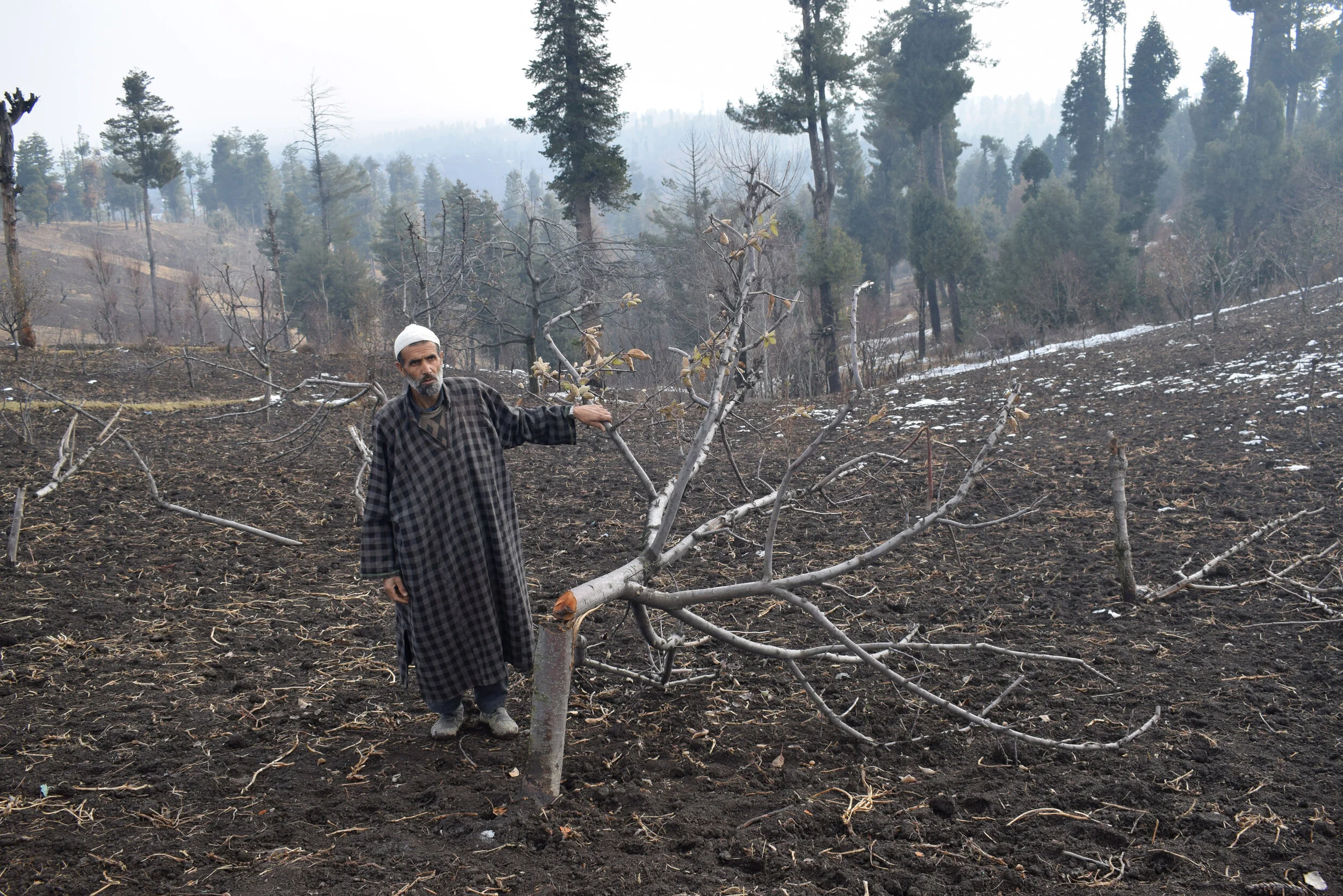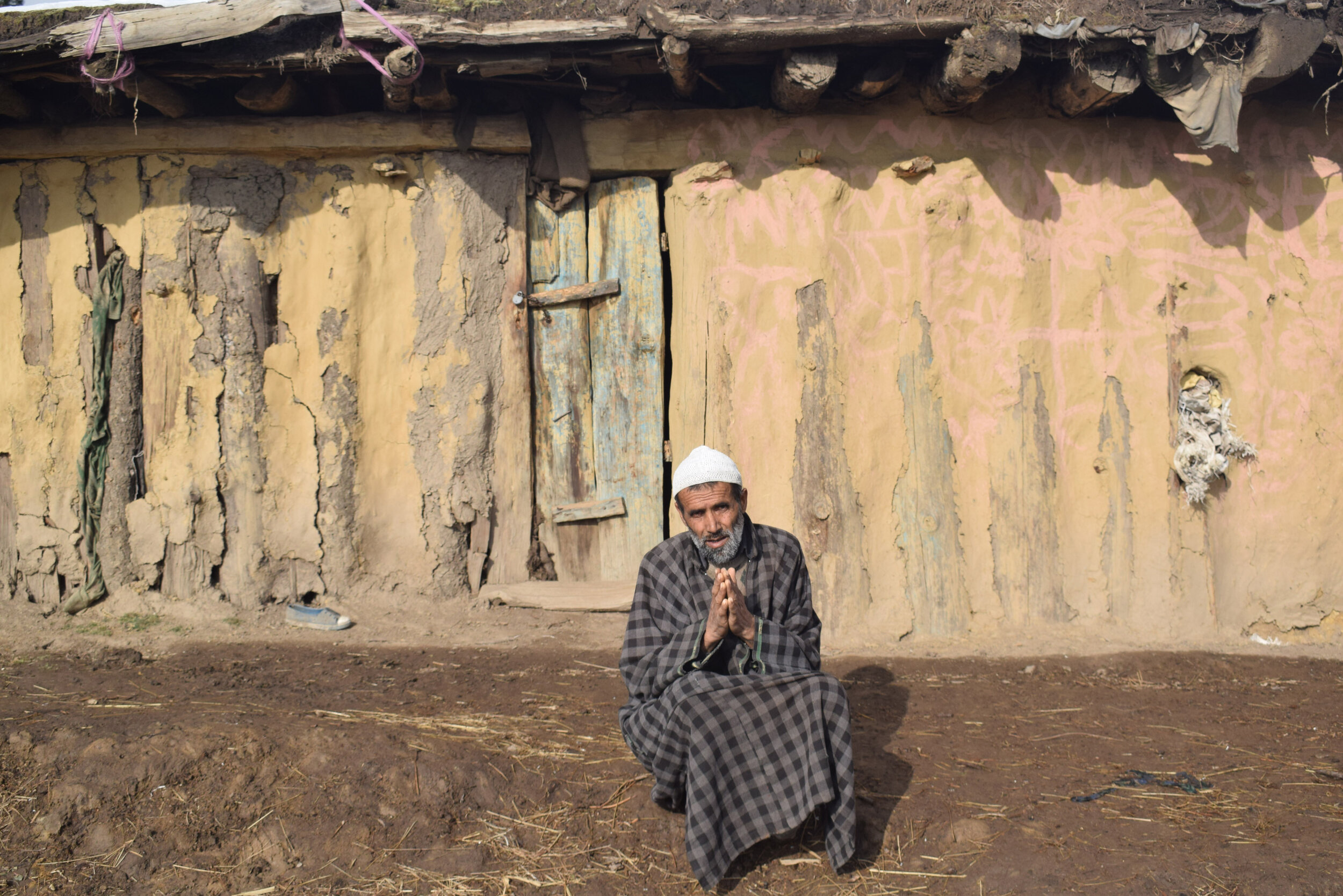Why India is evicting Muslims from forests in Kashmir and axing thousands of trees
Five men from Kanidajan village show their eviction notices from the government to leave their homes and land immediately. Photo by Basit Zargar.
KANIDAJAN— Ahsan Wagey, 62, felt shock after government forest department officials handed him an eviction notice and began clearing out his sprawling orchard of 200 apple trees.
“We have been cultivating the land for more than 100 years, but axe wielding men suddenly swooped on our village and destroyed the orchards,” Wagey said.
The move comes a year after the Indian government scrapped Kashmir’s semi-autonomous rule in August 2019 and created a law to allow Hindus from outside the region to buy land there, work in government jobs there and own businesses in Kashmir for the first time if they meet certain requirements. In July 2019, a high court directed the government to remove encroachments on government forest land in Kashmir. The forest department said in the court that 64,000 people have illegally occupied nearly 44,000 acres of forest land there.
The apples were Wagey’s family’s only source of income for decades in Kanidajan village in Budgam district, 40 kilometers from Srinagar, the capital. The notice ordered Wagey to move out immediately, without any prior warning, he said.
About 400 families of 1,200 people have been cultivating the forest in Kanidajan for several decades. Wagey estimated 10,000 apple trees belonging to 35 apple growers were razed in Kanidajan and the adjoining Nagbal areas in the past month. Other families Religion Unplugged spoke to said their eviction notices gave them only 10 days to leave their homes, making many families homeless just as a frigid winter settles across the Himalayan region.
Zoona Begum, a 108-year-old woman in Budgam, said she is scared of being uprooted in the middle of a harsh winter season and the coronavirus pandemic.
“We will not go, we have been living in the village since generations,” Zoona said. “Where will we go in these harsh winters?”
More than 1.5 million forest-dwelling Muslims like Wagey live in Jammu and Kashmir (about 12% of the population), mostly working in agriculture and living in temporary sheds and mud houses in the mountains. Some are nomadic and move from place to place for seasonal work with their herds of goats, sheep and horses. The government has been evicting the nomads and demolishing their homes and crops since November.
Shariefuddin Bajad stands near damaged apple trees cut by the forest department at Kanidajan in Budgam district. Photo by Basit Zargar.
“It is a big loss for me,” said Shariefuddin Bajad, a former resident of Kanidajan. “If the government wants evict us it should have come up with an alternate plan for our settlement.”
Critics of India’s Hindu nationalist ruling party believe the government’s move to repossess land is a tactic to change the Muslim character of the country’s only Muslim-majority region.
“After the government developed the area and provided amenities like water and electricity to the residents, clearing the lands defies logic and raises questions,” said Bashir Ahmad, whose 30 apple trees were axed by government forest officials.
Jammu and Kashmir is 68% Muslim and 30% Hindu. West Pakistani Hindu refugees who’ve lived in Jammu for decades are prime beneficiaries of the new laws that allow non-Kashmiris to own land and work in Kashmir.
Kashmir has struggled to end deadly conflict between militant separatists and Indian security forces for decades. While the region partitioned itself between India and Pakistan in 1947, both countries claim the territory in full, and Indian-administered Kashmir possesses a vital water source for the larger region in its rivers. Part of Kashmir had acceded to India at the time of India’s independence rather than merge with a Muslim Pakistan under an Indian constitutional provision called Article 370 that allowed a semi-autonomous rule in Kashmir.
Prime Minister Narendra Modi’s government scrapped that provision in August 2019, imposing a harsh lockdown that for many months banned phone service and Internet while security forces detained thousands of young men under a law that allows the authorities to hold people suspected of terrorism without evidence or trial for two years.
In ‘90s many Kashmiri Hindus fled for their lives and settled outside the valley in places like Jammu and Delhi. Modi’s Bharatiya Janata Party (BJP) campaigned on a promise to restore order in Kashmir, fight Pakistani terrorism and allow Hindus to settle in Kashmir. Many worry that Hindu migration to Kashmir will change its Muslim character.
Former Chief Minister of Kashmir, Mehbooba Mufti, went to Pahalgam to meet with the nomads.
“Visited Gujjar families in Lidroo, Pahalgam today,” she tweeted. “Jammu and Kashmir admin’s ‘demolition drive’ has rendered them homeless and that too in the peak winter time. The systematic targeting of nomads throughout Jammu and Kashmir is being justified under the guise of ‘illegal occupation’.”
On Dec. 8, security forces stopped Mufti from visiting Budgam and detained her at her home.
Shariefuddin Bajad sits outside his home that he has been evicted from. Photo by Basit Zargar.
Many of India’s national laws were extended to Kashmir after its semi-autonomy was revoked, but analysts say the government has been slow to implement the Forest Rights Act (FRA) in Kashmir for tribal people to benefit from their rights to the forest land like in the rest of India. The FRA passed in 2006 recognizes the right of India’s 150 million indigenous people (among the poorest groups in the country) to live off of unoccupied government forest land. Successive governments in India have sold government land with rich resources to private companies and evicted poor Indians (and trees) from the land in the process.
Raja Muzaffar, an activist, said the forest act has been extended to Jammu and Kashmir under a 2019 J&K reorganization act that was supposed to have immediate effect, but the process of its implementation has not been carried out even a year later.
“It is a deliberate attempt to target the tribal community in Jammu and Kashmir,” Muzaffar said.
He said it is ironic that the administration wants to raze forest land in Kashmir to create industrial estates and hotels but forest dwellers with a legal claim to the land are being evicted.
“It is illegal to cut the trees,” he said. “Not only fruit bearing trees were cut but non-fruit bearing trees were chopped as well. The demands of forest dwellers are not illegal. The laws good for the people are not being implemented but those which are draconian are being implemented.”
The forest dwellers say that the non-implementation of the FRA in Jammu and Kashmir is the root cause of their eviction. Without the law’s protection, they are powerless.
“We want the FRA to be implemented in Kashmir without delay. Only that will stop our eviction and bring a halt to chopping of trees,” Bashir Ahmad said.
Meagan Clark contributed to this report.
Basit Zargar is a Kashmir-based photojournalist.
Zaffar Iqbal is a journalist based in Kashmir, India. He has reported for 18 years on armed encounters, environmental issues, crime, politics, culture and human rights. He’s formerly the bureau chief of Jammu and Kashmir for NDTV.



